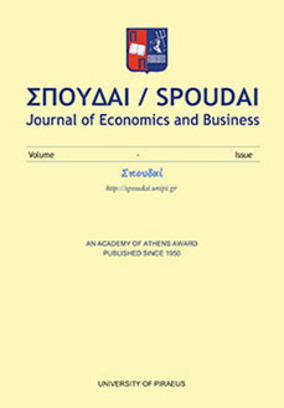Public policy effectiveness on a loss to society function and inflation dynamics
Part of : Σπουδαί : journal of economics and business ; Vol.56, No.2, 2006, pages 7-43
Issue:
Pages:
7-43
Abstract:
The objective of this work is to test the effectiveness of public policy on a social loss function by considering the inflation dynamics. The paper develops a few models through a variety of partial equilibrium equations from the real and monetary sector of our economy by examining public policy objectives and optimization intentions for the society. The model considers a loss to society function and measures with the utilization of various specifications the growth of different target variables, which depend on central bank’s and individuals’ goals and uses these potential values to forecast inflation rate, to determine price levels, and to study the dynamics of our target variables. The preliminary empirical results support the theory that prices depend on the price of oil, on the rate of interest and money supply (monetary policy), on risk (uncertainty), on production, on savings, on financial market (stock market), on unemployment, on taxes (fiscal policy), and on consumer sentiment. They also reveal the ineffectiveness of our traditional public policy, due to dramatic changes and the complexity of our socio-economic system.
Subject (LC):
Keywords:
forecasting, price level & inflation, monetary policy
Notes:
Περιέχει πίνακες, σημειώσεις και βιβλιογραφία, We would like to acknowledge the help provided by our research assistants, Maen Abdelhafez, Kristin M. Mangan, and Deborah McGovern; also the seminar participants at various venues for helpful comments. Financial support was provided by Henry George Research Funds (Robert Schalkenbach Foundation). The usual disclaimer applies.




